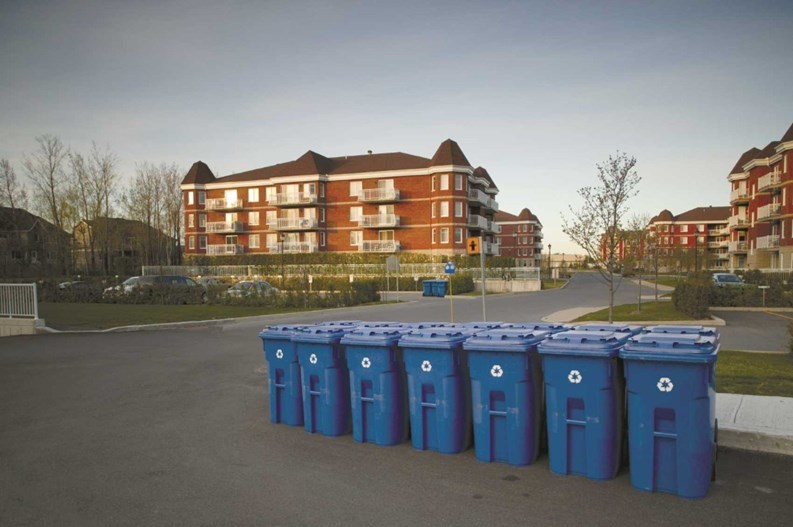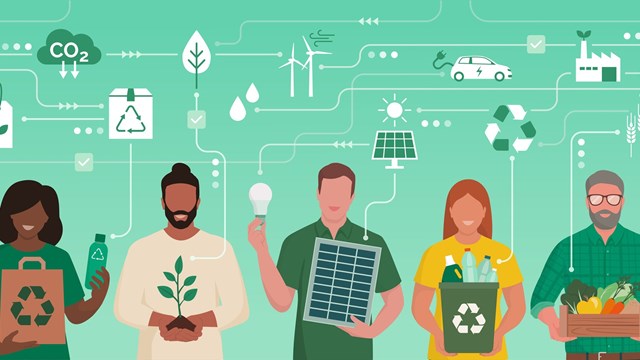It’s hard to believe that recycling was a pretty novel concept not too long ago, especially for municipalities. In the 1970s and ‘80s, local governments started to establish recycling programs due to rising energy prices and a growing concern for the environment. Little by little, in the last 40 years, more and more Americans have made recycling a regular part of their daily lives. When you take out the trash, you also sort the recycling—they’re part of the same routine.
Don’t Get Trashed
In the last few years, the recycling industry has seen new technologies and political energy that are creating some of the largest shifts in how people and cities handle their trash in recent memory. Simply recycling glass bottles and newspapers isn’t the goal anymore. Garbage hauling has become a greater and greater expense for towns and cities. Citizens are more defensive of their surrounding areas, and don’t want landfills sited in their respective communities.
In New England, the availability of new land to be turned into landfills doesn’t exist like it used to. Many cities and towns in the region pay a high price to have garbage hauled away in trucks to other parts of the country where landfills are still available. New England’s civic-mindedness has brought along some efforts to decrease those hauling costs, and follow the lead of other recycling-heavy cities like San Francisco and Toronto, which have implemented a slew of programs, creating ways to cut down how much refuse gets thrown into landfills.
There are essentially two aspects of recycling that are needed: compliance from residents and businesses, and the infrastructure that collects and sorts the materials. Thanks to new technologies, cities are adopting several new systems for dealing with recyclables. Traditionally, paper and plastics have been kept separately for collection, since they are ultimately broken down and re-purposed separately. But, that is changing.
’Single-stream’ systems allow all designated recyclables—papers and containers—to be collected together. It has the benefits of making it easier for residents to participate, which is now well-documented, and cheaper to collect,” says Kendall Christensen, a senior consultant to InSinkErator, a garbage disposal manufacturer, and former assistant director to New York City’s recycling program. Boston just recently adopted a single-stream program, so now city residents do not have to separate their papers and plastics.
Without the hassle of keeping paper and plastic separate, the whole collection process is simplified, and just as important, it’s less work for residents to sort recyclables. But there is a downside to the single-stream method. “The improvements in processing technology at recycling centers make it possible to sort and separate various materials, but not without a slight increase in contamination, which can affect marketability of some materials,” says Christensen. Glass bottles become especially problematic in single-stream systems because the sorting technology that separates paper from plastic containers uses size to sort them. It crushes up all the recycling, and in the process glass bottles shatter and shards find their way into the paper or plastic piles unintentionally.
Is that yogurt container a 1 or a 5? Which numbers can you recycle? In the city of Boston, and most of its surrounding towns, you don't have to find those elusive recycling numbers on plastic containers anymore—every hard plastic can now be recycled together. Plastic bags and other flimsy non-rigid still cannot be handled by sorting plants, but everything else can. “Adding mixed plastics to recycling programs eliminates confusion and encourages diversion. Markets are still figuring out how to sort and use all of those materials, with some promising new technologies like converting plastics back to oil,” says Christensen.
But there’s only so much plastic and paper to recycle. If cities and surrounding municipalities are to cut down more substantially on the trash they send to landfills, the next big contributor is food waste. “As much as 30 percent of apartment-building waste is a combination of food scraps and other compostable materials, making it the next holy grail for waste management professionals,” says Christensen. “Some cities are allowing food scraps to be mixed with yard waste for truck-based collection and delivery to composting facilities, which are being pushed further away from cities to manage odors.”
Reducing Organic Wastes
The Bay State is one of the few states taking action in regard to recycling organics. In most other states in America, recycling and garbage policy is left to local governments. “Massachusetts is on the verge of tackling commercially-generated organics,” says Christensen. “Cambridge is the in early stages of testing residential systems for diverting organics.”
In the last ten years or so, many environmental-minded New Englanders have decreased their organic waste themselves with their own compost bins if they have a backyard, or they pay someone to come and pick up their food waste for composting. But those options can be quite difficult for condo and co-op residents.
Vermont is also getting on the bandwagon. The Green Mountain State recently passed a law phasing in mandatory recycling and composting of food and organic waste, eventually banning those materials from landfills. Vermont Gov. Peter Shumlin signed into law House Bill 485 that calls for all residents to recycle or compost food waste by 2020 and prohibits the disposal of recyclable and compostable materials in landfills. The law took effect July 1, and the phasing-in begins with large food waste generators in 2014.
During the phase-in period the law will require waste haulers to collect yard waste as well as food waste. It calls for the number of recycling containers to equal the number of waste bins in public facilities.
The goal is for Vermont to move toward sending a minimal amount of waste to landfills while maximizing recycling and composting, the governor said in a statement. “Moving towards universal recycling will advance Vermont into the next generation of solid waste management and keep more waste out of our landfills,” Shumlin said. The state currently recycles 36 percent of its waste, but the rest can be recycled, the governor states.
Obviously, rates of recycling in New England vary greatly state by state, and city by city. But, states that are seeing greater population growth like Arizona and Florida tend to have worse recycling rates, in large part to the lack of material recycled in construction projects. The magic number for recycling advocates is called the diversion rate. The diversion rate is the percentage of all disposable material a city produces—which includes recyclable materials, organic refuse, and regular old trash—that doesn't end up in a landfill or incinerator.
Only a few years ago, the city of Boston was well below the national average, at about 19 percent, but it has since risen to 30 percent — better, but still below the national average of 34 percent.
Meanwhile, San Francisco is leaving every other American city in the dust. As of today, the other city by the bay boasts an 80% diversion rate, and has plans to improve on that. “I would say that the cities that are at the leading edge of waste reduction, recycling, and composting, have zero waste planning and zero waste goals. Often when people hear ‘zero waste’; we’re not going to get to zero waste. It’s really a policy framework; you know if you’re not for zero waste, how much are you for? Along the same lines of a manufacturer with a goal of zero defects in their products,” says Brenda Platt, co-director of the Institute for Local Self-Reliance, a think tank based in Washington, D.C.
Processing Your Trash
Even in the more successful recycling cities like San Francisco, one of the most difficult factors to manage is making it easier for multi-family buildings, including co-ops and condos, to recycle. Large buildings have chutes for garbage collection, but rarely for recycling. “In some communities I’ve been to, they have the garbage chute; but if you want to recycle, you have to walk it across to the bins on the other side of the parking lot, and you’ll get 10% to 20% of the residents doing that. To be successful to get high recycling levels, it has to be as convenient as trash,” says Platt. “If you only pick up recycling once a month, but trash is every week—guess what? You’re not going to get as much recycling.”
Steven Dannin, president of Dannin Management in Brookline, Massachusetts, says condos are almost automatically outfitted with a straightforward trash collection system, but it’s rarely as such for recycling. “Most buildings were not built with chutes for both, that’s part of the problem. So there’s a central location for the trash, and then you need to come up with a system for recycling — whether it’s a little room on each floor that you have to pick up every day, or a central location where homeowners bring it to. Most people don’t want expend much effort in doing it if you’re in a multi-unit building,” he says.
In suburban and rural areas of New England, there are several confusing layers of jurisdictions and municipalities. But depending on the town or city, the law generally requires multi-unit communities to find private haulers. “Most of the cities where I have communities do not have townhome programs, Newton specifically. Homeowners in Newton condos have to pay to have their trash and recycling removed. They have to have a private hauler. In communities we manage, the budget allows for the program to be paid for by condominium fees,” says Dannin.
Getting recycling in the contract is common, but not made easy, since it’s treated separately from trash services. “It’s a completely independent contract. They have to negotiate trash and recycling. All of our communities have recycling, but they’re spending more to do it,” says Dannin. That said, communities can still do their best to leverage the amount of recycling they do to lower the costs of trash collection, assuming they’re able to generate less trash. “Let’s say you have an [association’s contract] for renewal, the bid can now require a green bin for organics, a blue bin for recyclables—and that you have to reduce our trash costs because we’re not filling in the garbage bin as much,” says Platt.
Recycle, Reduce, Reuse
Recycling is rarely as easy as garbage in a bigger building, especially when you have to hire your own hauler. If your building is in a major urban center, your condo or co-op might not be eligible for municipal garbage collection.
Massachusetts: As indicated, Massachusetts does not require mandatory recycling; it is left to individual municipalities. Its overall recycling rate varies by town and statewide sits at about 30%. Bills have been filed in the 2013 legislative session by Rep. Jason Lewis, D-Winchester, and by Rep. Paul McMurty, D-Norfolk, to seek mandatory and universal recycling throughout the Commonwealth.
Connecticut: Connecticut requires recycling in all of its 169 towns and cities and each community has a municipal recycling coordinator. In 2010, the Nutmeg State recycled and composted about 26% of its total waste stream. While that rate might seem impressive, it has remained relatively flat over the past decade. Connecticut still disposes of 2.4 million tons of trash annually, an estimated 1,370 pounds of trash per person per year.
Maine:The state’s recycling rate in 2010 was 38.7%, and public recycling services were expanded to serve 98% of Maine’s population. Two hundred thirty-eight municipalities participated in household collection programs in 2010.
New Hampshire: The New Hampshire Department of Environmental Services (DES) monitors the recycling of plastic bottles, white goods, glass, plastics, aluminum containers, steel cans, scrap metal, motor vehicle batteries, tires, and municipal solid waste. In 2010, New Hampshire’s recycling rate was 21%.
Vermont:Each year, Vermonters generate about 600,000 tons of waste, almost one ton per person per year.
Rhode Island:Effective July 1, 2012, Rhode Island set a goal for its 39 municipalities stating that cities and towns are required to recycle a minimum of 35 percent. All municipal recycling and trash must be delivered to the Rhode Island Resource Recovery Corporation (RIRRC), home of the state’s landfill and recycling facility.
Generally, suburban communities do not have the political groundswell to initiate such green initiatives, but it's not impossible if a community is so motivated. “A lot the major haulers like Waste Management are becoming full service providers. Even if your contract renewal isn’t up yet, you can still negotiate something. It’s in their interest to do it because once their contract comes up in can go out to an open bid,” says Platt.
Unfortunately, multi-unit communities such as condos and co-ops face several obstacles that prevent them from being on the leading edge of modern recycling practices. That said, a green-minded board and community can always find ways to swim against the current and make their own diversion rates higher, or lobby for more inclusive recycling practices found in urban areas. More comprehensive plans for dealing with refuse might raise taxes in the short term, but finding landfills and places to burn trash will only become more difficult and more costly as time goes on.
Tom Lisi is an editorial assistant at New England Condominium.







Leave a Comment